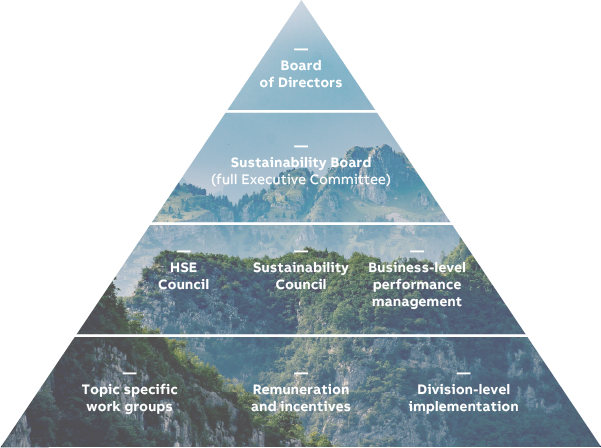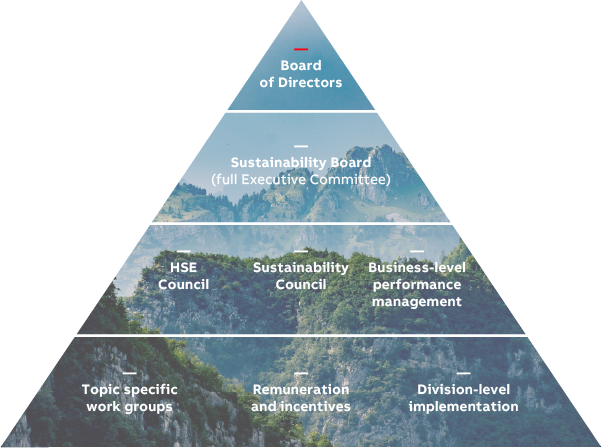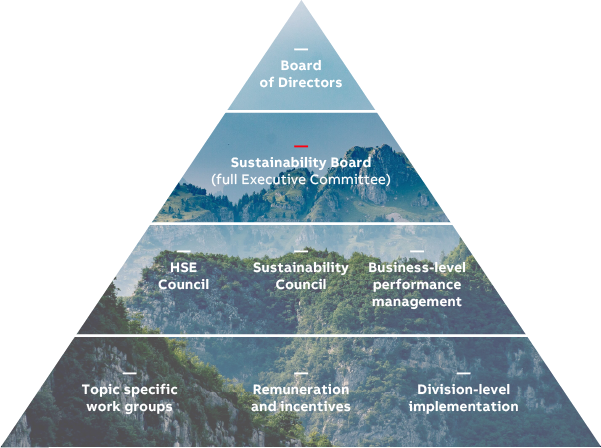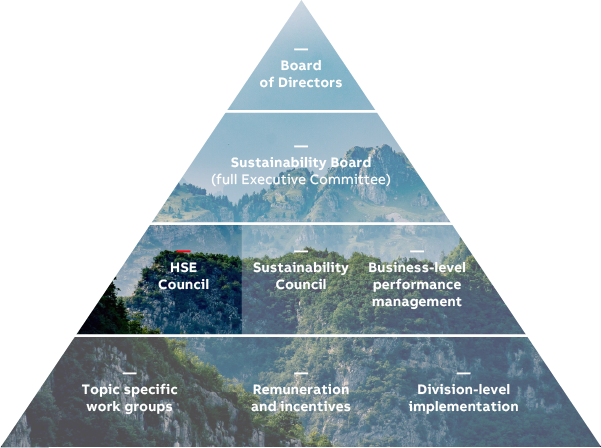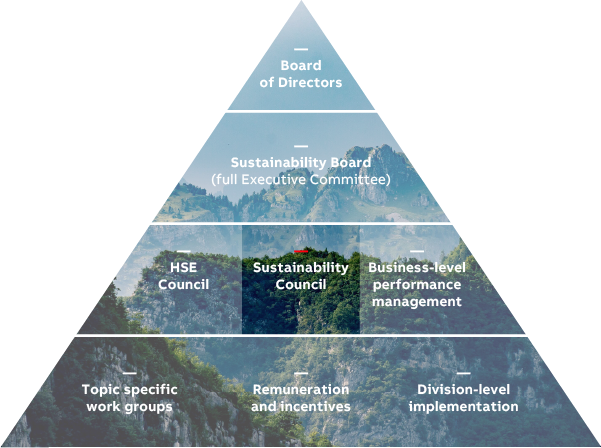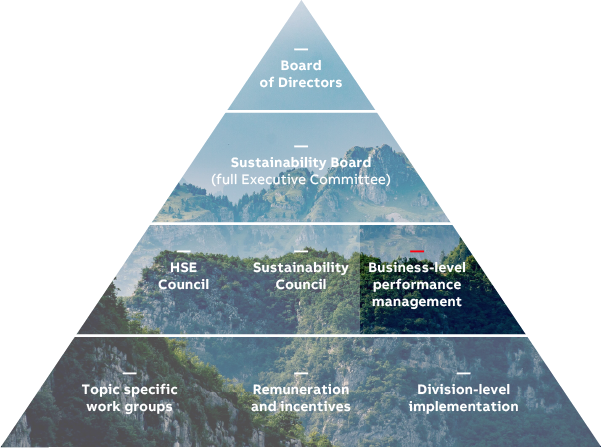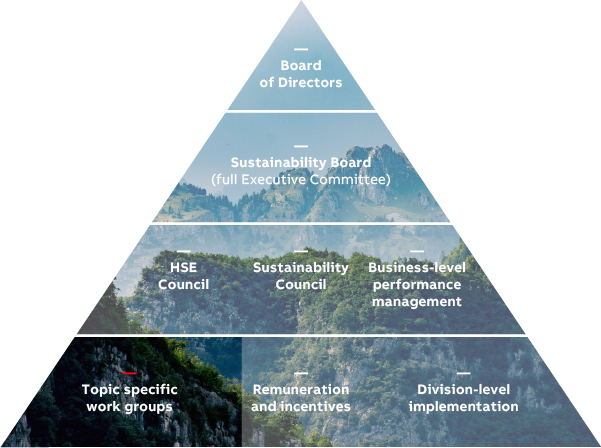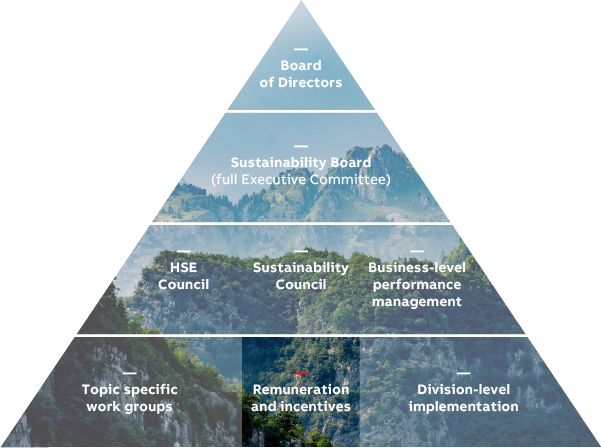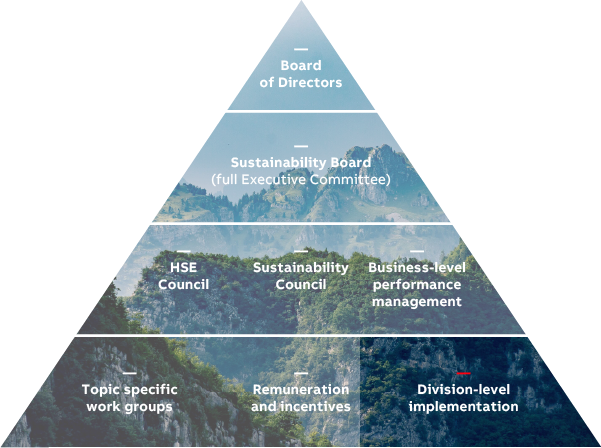Sustainability at ABB
About ABB
ABB is a leading global technology company that energizes the transformation of society and industry to achieve a more productive, sustainable future. By connecting software to its electrification, robotics, automation and motion portfolio, ABB pushes the boundaries of technology to drive performance to new levels. With a history of excellence stretching back more than 130 years, ABB’s success is driven by about 105,000 talented employees in over 100 countries.
What sustainability means to ABB
Sustainability is central to ABB’s Purpose and the value that we create for our stakeholders. To us, sustainable development means progress towards a healthier and more prosperous world, today and for future generations.
A sustainable society balances the needs of society, the environment and the economy. ABB achieves this by embedding sustainability in our value chain and by pushing the boundaries of technology to provide our customers with solutions that help preserve the earth’s natural resources while contributing to an economically vibrant, low-carbon society.
Our focus on sustainability includes our commitment to responsible business practices. ABB's corporate governance and operating model are underpinned by integrity and transparency. Promoting social progress for our people and in the communities in which we operate is central to our Purpose and our identity as a company.
ABB’s 2030 sustainability strategy positions our company to address the world’s greatest challenges. As a technology leader, we focus on those areas where we can make the biggest impact: enabling a low-carbon society, preserving resources and promoting social progress, while complying with relevant regulations and applying our own standards wherever we operate. To meet our 2030 sustainability targets, we are taking action across the value chain because we believe we can have a greater impact by acting in coordination with our customers, suppliers and other stakeholders.
ABB has also assessed how its strategy and business could be affected by climate change. Based on the various scenarios, we consider it most unlikely that climate change would pose an existential threat to our business.
In 2021, we initiated our 2030 sustainability strategy by establishing new sustainability governance structures, by beginning to work towards our new targets, and by carrying out pilot studies for additional new targets. In the course of the year, concerted efforts were made to build awareness among our stakeholders of the scope of our ambitions.
Business model and value chain
Our operating model, the ABB Way, has our Purpose at its core and serves as a framework for implementing our strategy. By pushing the boundaries of technology and embedding sustainability in everything we do, we are raising the performance of our market-leading and empowered businesses to new heights. Alongside our values, governance framework and strong brand, the ABB Way is making ABB a more transparent and efficient company, driving a performance culture and creating value for all of its stakeholders.
ABB value chain
ABB value chain
1Non-order related R&D expenses
2Adjusted Group effective tax rate, adjusted primarily to exclude gains and losses on sale of businesses
3Consists of $2.7bn for the share buyback program and $1.7bn dividend payments
4See chapter on EU taxonomy
Sustainability governance
With the organizational changes made in 2021, accountability for the implementation of Group requirements for health, safety and the environment (HSE) was transferred to the Business Areas and Divisions. The ABB Group Sustainability and HSE & Security functions are responsible for the development and coordination of the Group’s policies and programs that address matters related to health, safety, the environment and corporate responsibility. These functions report directly to the Chief Communications and Sustainability Officer, who is a member of the Executive Committee.
Sustainability governance
Sustainability governance
Board of Directors
The Governance and Nomination Committee is responsible for overseeing corporate social responsibility (including health, safety and environment as well as sustainability), while ultimate responsibility for ABB’s sustainability strategy, its sustainability targets and its annual Sustainability Report lies with the entire Board of Directors. The Compensation Committee ensures that ABB’s remuneration policies are linked to the achievement of its sustainability targets.
Sustainability Board(full Executive Committee)
Implementation of the strategy is led by ABB’s Sustainability Board, comprising the full Group Executive Committee. The Sustainability Board oversees policies and programs, reviews developments, and monitors progress towards targets.
HSE Council
The four Business Area HSE managers and the corporate HSE & Security function work together in an HSE Council that convenes twice yearly. The council reviews the function’s steering committees, approves and monitors the common Annual Plan, and assesses risks and opportunities for the company. The work of the HSE Council is overseen by the HSE & Security Board, which meets twice yearly to perform a management review and consists of the four Business Area Presidents, the CEO, the Chief Communications and Sustainability Officer and the Head of Corporate HSE & Security.
Sustainability Council
The Sustainability Board is advised by a Sustainability Council, consisting of the Group Head of Sustainability and representatives from our four Business Areas. The Sustainability Council’s purpose is to ensure alignment across Business Areas on the strategic direction of sustainability, common topics and sharing of best practices.
Business-level performance management
Efforts within the Business Areas are supported by a strong set of policies and procedures, along with sustainability leads in each Business Area and Division, responsible for driving the sustainability agenda and for representing the Division in Business Area and Group-wide discussions.
Topic-specific work groups
Thematic work groups are appointed by the Sustainability Council to provide expertise and develop methodologies on topics and initiatives linked to the sustainability targets. The work groups ensure their operational definition and implementation action plans. They share best practices and propose relevant KPIs.
Remuneration and incentives
In 2021, as in prior years, safety was one of the KPIs in our management incentives. As of 2021, additional sustainability KPIs are progressively being incorporated into our senior management incentives. For further information, please refer to “Senior Management Sustainability Incentives” in this report.
Division-level implementation
Based on the Group's and Business Areas’ policies and procedures, each Division has developed its own sustainability governance and organizational model, suited to its operational approach. In some Divisions, a network of “sustainability champions” was formed and cross-Division workstreams have been created to ensure alignment and the sharing of best practices and to coordinate sustainability programs.
ABB employs a worldwide network of HSE and sustainability specialists, who report to each of the Business Areas and support the Sustainability and HSE & Security functions. In each of the regions in which ABB operates, ABB employs HSE & Security advisors or managers. The country and regional specialists are supported by sustainability officers and health and safety advisors. Overall, the sustainability network is supported by some 600 full-time and part-time employees. The impact of ABB’s sustainability network has been expanded by our new strategy, which mobilizes ABB employees and all functions across our four Business Areas and throughout our corporate organization to act on our sustainability initiatives on a global basis.
In 2021, the Sustainability Council focused on deploying the action plans linked to the major targets of ABB's 2030 sustainability strategy - in particular, ABB’s goals for carbon neutrality, on developing ways to measure ABB’s contribution to reducing our customers’ GHG emissions, and on further embedding circular economy principles within our businesses.
In 2021, our Sustainable Supply Base Management (SSBM) system replaced our Supplier Sustainability Development Program (SSDP). The process is governed by a steering committee and a working group comprised of representatives from the Business Areas and the Sustainability function. For further information, please refer to Responsible Sourcing in this report.
Contribution to the Sustainable Development Goals (SDGs)
Adopted by the member states of the United Nations in 2016, the 17 SDGs were developed as a blueprint for achieving peace and prosperity by 2030. ABB continues to align its sustainability strategy with the SDGs on which we can have the greatest impact.
In 2021, ABB contributed to the global effort to meet the SDGs by supporting policies that promote the electrification of land-based and marine transport systems, improvements in energy efficiency in industry and buildings, and industry-specific sustainable technologies. For example, we are promoting high electric charging infrastructure targets (including for e-trucks) in the revision of the EU's Alternative Fuels Infrastructure Regulation (AFIR), which is currently in the legislative process.
ABB also worked within industry associations to accelerate sustainable development. For instance, ABB is using its position as Chair of the Sustainable Mobility Task Force at Orgalim, Europe’s technology industry association, to promote ambitious decarbonization and electrification commitments for road transport. ABB also participated in sector-specific working groups on energy, mobility, buildings and industry, which supported a major study on fighting climate change in Germany. ABB additionally became a founding member of the Zero Emission Transportation Association, an advocacy organization in the United States.
In 2021, as the world’s major economies launched plans for sustainable development in the post-COVID-19 era, ABB engaged in an assessment of the associated risks and opportunities. Initiatives assessed included Next Generation EU, the EU’s Green Deal policy initiatives, and the Infrastructure Investment and Jobs Act in the US, among others.
